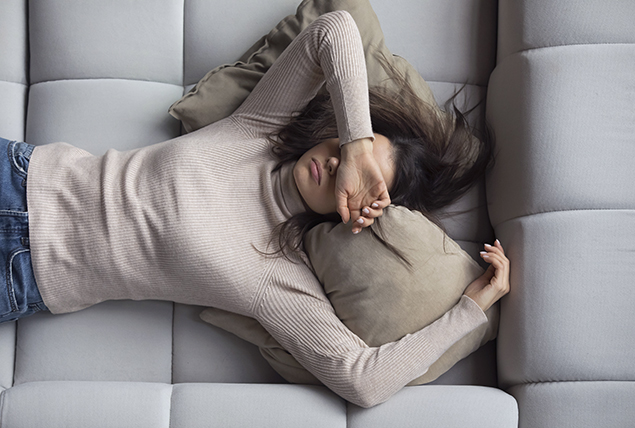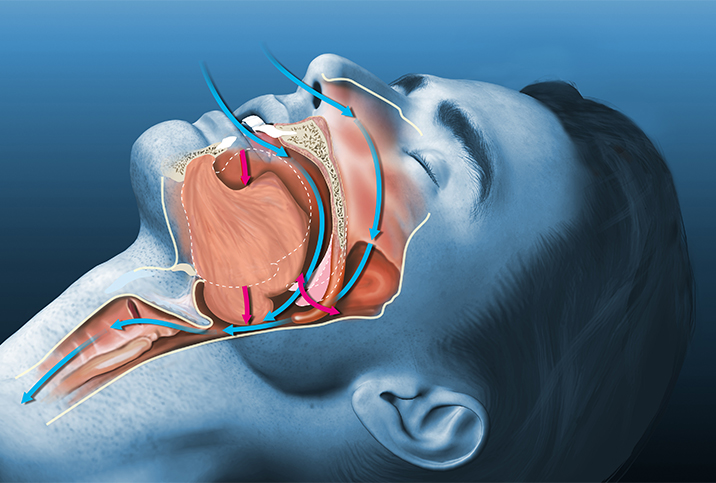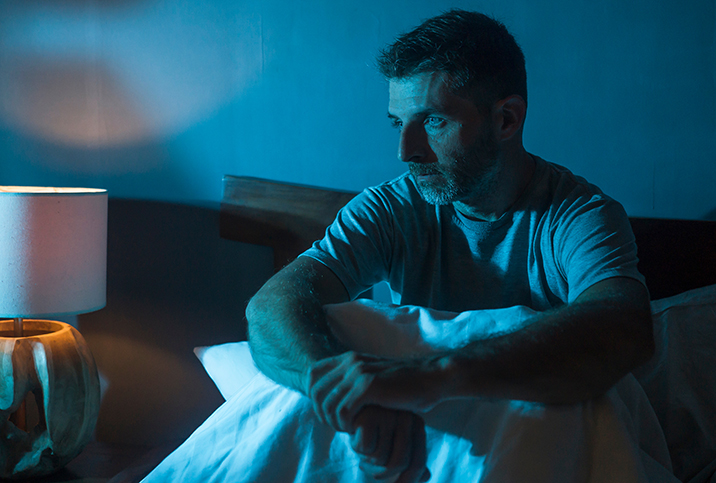The 9 Most Common Sleep Disorders

Key Points
- Sleep disorders can be recognized by at least one of four key indicators, including difficulty falling or staying asleep, excessive daytime sleepiness, disruptions to the sleep-wake cycle and unusual behaviors during sleep.
- Treatment recommendations can vary based on the individual and the severity of their symptoms.
- Sleep disorders can also contribute to or cause erectile dysfunction (ED) in men.
It's estimated that 50 million to 70 million Americans chronically suffer from a sleep disorder. But what exactly qualifies as a sleep disorder?
"A sleep disorder is a condition affecting the quality, timing or duration of sleep, leading to difficulties in sleeping, staying awake during the day or functioning normally," according to Sunjya Schweig, M.D., the founder and executive director at the California Center for Functional Medicine in Berkeley. "The International Classification of Sleep Disorders (ICSD), published by the American Academy of Sleep Medicine, identifies 60 distinct sleep disorders, each with its unique triggers, symptoms and physical as well as emotional consequences."
Additionally, sleep disorders are recognized when patients suffer from at least one of the four key indicators, including difficulty falling or staying asleep, excessive daytime sleepiness, disruptions to the sleep-wake cycle and unusual behaviors during sleep, he said.
9 common sleep disorders
"It's important to note treatment recommendations can vary based on the individual and the severity of their symptoms," Schweig said. "It's always best to consult with a healthcare provider for personalized recommendations."
Check out the most prevalent sleep disorders and their treatment options.
Insomnia
This sleep disorder manifests as difficulty falling asleep or staying asleep, or waking up too early. Difficulty initiating or maintaining sleep may often manifest itself as excessive daytime sleepiness with functional impairment throughout the day.
Common treatment options may include identifying and addressing underlying medical or psychological conditions, cognitive behavioral therapy (CBT), sleep hygiene, lifestyle modifications and medication (e.g., sleep aids, antidepressants). Insomnia affects people of all ages, but older adults, women and people with certain medical or psychiatric conditions (such as depression or anxiety) may be at higher risk.
Upper airway resistance syndrome (UARS)
This is a type of sleep-disordered breathing similar to obstructive sleep apnea (OSA) but is milder in its presentation. If you have UARS, the upper airway becomes partially obstructed during sleep, leading to an increase in resistance to airflow and difficulty breathing.
Treatments for UARS include breath training, oral myofunctional therapy, and lifestyle modifications such as losing weight, avoiding alcohol and changing sleeping positions. Some people may benefit from an oral appliance and/or an evaluation to see if they have tongue tie (ankyloglossia), where a short band of tissue holds the tongue to the floor of the mouth and constricts its movement.
Sleep apnea
Sleep apnea is a breathing disorder in which breathing repeatedly stops and starts during sleep. People with sleep apnea characteristically make period gasping or "snorting" noises, during which their sleep is momentarily interrupted. You may experience excessive daytime sleepiness, as your sleep is commonly interrupted and may not feel restorative.
Sleep apnea treatments depend entirely on the cause of the issue. If other medical problems are present—examples include congestive heart failure or nasal obstruction—sleep apnea may resolve with treatment of these conditions. Other options include lifestyle modifications such as losing weight and avoiding alcohol and sedatives. Another solution is to use a continuous positive airway pressure (CPAP) machine to keep airways open during sleep. Surgery can provide solutions as can oral appliances to reposition the jaw and tongue. Sleep apnea is more common in men than women and is more likely to occur in people who are overweight, have a large neck circumference and/or have a family history of the disorder.
Recommended
- Sleep Apnea Is Ruining More Than Your Partner's Sleep: Your slumber problem could be negatively impacting your heart, so find the right treatment—now.
- Is It Time for a 'Sleep Divorce'?: More couples are sleeping separately, but this arrangement may not be right for everyone.
- Can You Have Sex on Your Period?: From religious or cultural taboos to hygiene issues, view the pros and cons of period sex.
Restless leg syndrome
People who suffer from restless leg syndrome experience this sleep disorder in various ways. Some experience a static/tingly feeling, while others feel muscle spasms. Either way, these sensations cause an uncontrollable urge to move their legs, keeping them from falling asleep or staying asleep.
Treatments include cutting back on certain triggers, such as caffeine or nicotine. Regular exercise, medications to increase dopamine levels in the brain and iron supplements (if an iron deficiency is indicated) are other treatment options. Restless leg syndrome is more common in women than men and is more likely to occur in those with a family history of the disorder.
Narcolepsy
A neurological disorder that causes sudden, uncontrollable episodes of daytime sleepiness, narcolepsy also causes a sudden loss of muscle tone or control. To treat narcolepsy, there are various medications to promote wakefulness. For instance, sodium oxybate is prescribed to improve nighttime sleep and there are specific lifestyle modifications that can help, such as regular exercise carried out in daylight. Narcolepsy affects people of all ages and genders but is often diagnosed in adolescence or young adulthood.
Parasomnia
Parasomnias are a category of abnormal behaviors or movement occurring during sleep, such as sleepwalking, night terrors, REM sleep behavior disorder and even sexsomnia, which is a form of parasomnia where sufferers engage in sexual activity while they are sleeping.
Treatment options include addressing underlying medical or psychological conditions, improving sleep hygiene and prescribed medications in some cases. Parasomnias can affect people of all ages but are more common in children and adolescents.
Circadian rhythm disorders
The circadian rhythm naturally occurs in the body and signals for when it's time to sleep and when it's time to wake, most commonly understood as your internal clock. Circadian rhythm disorders cause disruptions in the body's internal clock, leading to problems falling asleep, staying asleep or waking up at appropriate times.
Treatments to reset the body's internal clock include behavioral therapies such as light therapy or chronotherapy and/or medications such as melatonin or hypnotics. Circadian rhythm disorders can affect people of all ages but are more common in shift workers and people who travel frequently across time zones.
Bruxism
Known as teeth grinding or clenching, bruxism can lead to jaw pain, headaches and tooth damage. Treatment options include dental guards to protect teeth, relaxation techniques to reduce stress, and/or prescription medications such as muscle relaxants or antidepressants. Like many other sleep disorders, bruxism can affect people of all ages but is more common in children and adults under high stress.
Sleep-related movement disorders
Periodic limb movement disorders or sleep-related eating disorders qualify as sleep-related movement disorders. Since this type of sleep disorder covers a variety of other disorders, treatments typically aim to address underlying medical conditions, avoiding certain medications and/or taking prescription medications to improve sleep quality.
In some cases, treating an underlying condition, such as sleep apnea, may help improve symptoms. Sleep-related movement disorders also affect people of all ages but are more common in older adults and people with certain medical conditions, such as Parkinson's disease.
Does Normalizing 'Therapy Speak' Help or Hurt Our Relationships?: Terms such as "triggered," "trauma" and "boundaries" are being used increasingly in everyday communication, making it more normalized. Therapist-like terms could be weaponized by your partner and friends to do you harm.
Determining if you have a sleep disorder
Seeing a qualified medical provider as well as a sleep specialist is the only way to determine and diagnose a sleep disorder. However, people can recognize certain telltale signs on their own.
Schweig said if you're struggling to get a good night's sleep or feel persistently fatigued during the day, you may be wondering if you have a sleep disorder. Some common signs and symptoms of sleep disorders include difficulty falling asleep or staying asleep, excessive daytime sleepiness, fatigue or lethargy, snoring or gasping during sleep, pauses in breathing, and more.
"If you experience any of these symptoms on a regular basis, it's important to talk to your healthcare provider," he said. "They can help diagnose any underlying sleep disorders, offer guidance on lifestyle changes that may improve your sleep or recommend treatments such as cognitive behavioral therapy or medication. A sleep study may also be recommended to help diagnose certain disorders, such as sleep apnea."
Sleep disorders can lead to a rocky sex life
Sleep disorders can harm one's sex life in several ways, according to Jason R. Kovac, M.D., Ph.D., the regional medical director of Posterity Health, based in Indiana, Ohio and Michigan.
"People with sleep disorders often experience fatigue and feel tired throughout the day, which can lead to a decreased interest in sex," he said. "Additionally, some sleep disorders, such as sleep apnea and restless leg syndrome, can leave individuals feeling too tired for sexual activity because of disrupting sleep and frequent awakenings throughout the night."
Additionally, Kovac said sleep disorders can contribute to or cause erectile dysfunction (ED) in men.
"Research on sleep apnea has shown that it can contribute to erectile dysfunction, likely due to the fact that this disorder reduces oxygen levels in the blood and can affect some hormone levels," he said. "It should go without saying that sleep disorders can also impact relationships and intimacy between partners."
Disruptive sleep behaviors such as snoring, sleep apnea and other disorders can disturb a partner's sleep, which may give rise to feelings of resentment and/or tension in the relationship. When both partners are getting less-than-ideal sleep, it can lead to increased friction and arguments, Korvac added.
"A sleep specialist or a doctor who specializes in treating sleep disorders can diagnose and treat those disorders, which can improve not only sleep quality but also overall health and well-being, including sexual health," he said. "It's crucial to seek proper medical attention if you suspect you have a sleep disorder to receive an accurate diagnosis and effective treatment."


















